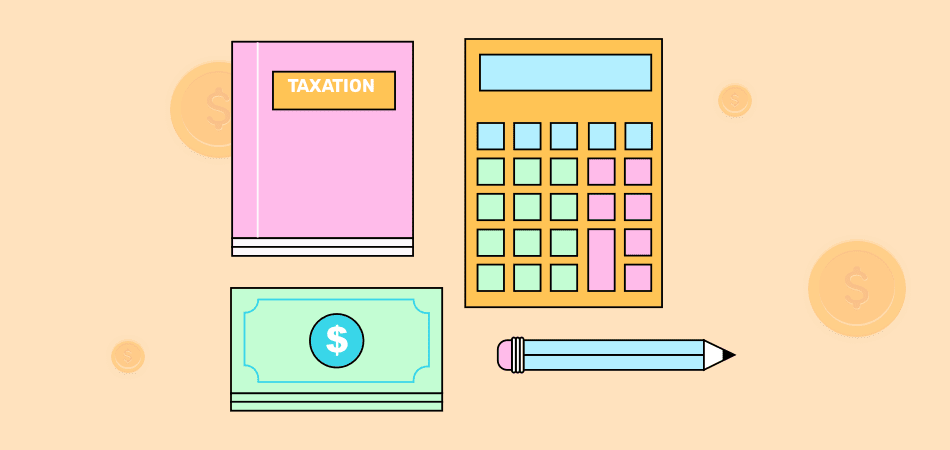Online Sale Tax: Detailed Guide for Your Online Store

The most considerable excitement and anticipation to an eCommerce business owner are opening their online store, tailoring the very first aesthetic design of their website, and selecting the appropriate products to sell in their soon-to-be-open store.
However, this rush of excitement comes with another topic of concern which is sales and uses tax compliance. eCommerce is undoubtedly the staple of the US economy. There is so much data available that shows the hike amount that has been suspended during the holiday season.
Yet, the growth of eCommerce continues to enhance day by day. Regardless of the worst condition of the economy, eCommerce businesses are not lacking anywhere.
The most significant benefit for many individuals is the convenience, choice, and, of course, price comparisons. However, there is a significant hidden benefit in the United States: no sales tax. For years, Internet business has benefited from a very favourable tax loophole in which the vast majority of purchases are exempt from sales tax.
However, given the budgetary crisis that many state governments face, this is likely to alter. To date, what has been holding back this change is that everyone despises the idea of taxing Internet businesses: consumers despite it because they will have to pay state taxes; businesses despise it because they will have to pay federal taxes, and governments despise it because they will have to pay federal taxes.
What Exactly Mean of Online Sales Tax
In general, it is a modest proportion of the sales price. Here, retailers may collect the
needed sales taxes in order to submit those amounts to the appropriate jurisdiction. If we talk about the United States, some places have a sales tax, including Washington, DC. Whereas Alaska, Delaware, Montana, Oregon, and Hampshire do not impose a statewide online sales tax. And, you will see that the maximum number of states that carry the sales tax is from 4% to 7%, which is 5.09% on average.
For states, sales tax accounts for almost 34 percent of total revenue. eCommerce sales tax money is used by states and other authorities and critical requirements. And governments' dependence on sales taxes to fund infrastructure improvements is unlikely to alter anytime soon.
| Get Started Now to Grow Your Online Business with the Best AliExpress Dropshipping Tool - DSers! |
The significant thing that brought us to write this article is the willingness to make you aware of the fact that being an online store owner; you can not ignore paying sales tax at any cost. In contrast, those who take it for granted and do not stay concerned about collecting the right amount of sales tax to remit it to the appropriate jurisdiction have to face massive penalties and financial fines for noncompliance.
You need to understand that it will not only affect your bank account but also demolish your image in the market as well. These sanctions have the most significant impact on small firms. They can also result in an unpleasant and perhaps costly audit. So, knowing your eCommerce sales tax requirements should be a top focus, whether you're just getting started with your first online store or expanding your existing company's online sales to new regions and platforms.
Top 6 Prevalent Forms of Online Sales Tax Nexus
On June 1, 2018, the definition of nexus was eternally altered. That was the day the United States Supreme Court decided in favour of the state in the historical case of South Dakota vs. Wayfair, Inc. This decision permitted states to force internet retailers to collect and remit sales tax based on a concept known as nexus.
What exactly is nexus? It denotes that the online store has a "strong relationship" with the state. Once nexus is established, online sellers are required to collect and pay sales tax on the basis of their commercial activities inside that jurisdiction.
The following are the 6 most prevalent forms of online sales nexus:
1. Industrial Nexus
Currently, all 46 states in the United States that collect a sales tax have economic connection criteria. Depending on the state, online retailers are required to collect and submit eCommerce sales tax when they exceed a specific number of sales or a certain dollar amount in sales activity.
Some jurisdictions, for example, may need an internet vendor to make more than $100,000 in sales before establishing monetary nexus. In contrast to this, other states may require at least 200 transactions to be delivered to addresses inside the state before determining financial connection. In addition, some states include resales or exempt products in their threshold criteria, while others do not.
2. Physical Appearance Nexus
This appears to be the most straightforward sort of nexus to comprehend when you roll your eyes around. If you are physically available in a state that levies sales tax, you must pay that state's sales tax. However, the term "physical presence" has a broad meaning. It implies that online merchants are required to collect and submit eCommerce sales tax in any state where they have their brands or service to sell.
Some jurisdictions now require businesses to file an online sales tax return if they sell items at events such as trade exhibitions. Another complication: If you employ drop shipping, the ship-to address may result in a physical presence nexus within a state.
3. Trading Nexus
What happens to online sales tax if you sell your items on a marketplace like Amazon, eBay, or Etsy? A marketplace facilitator nexus exists in 46 states. That implies the third-party marketplace where you sell may be liable for collecting and remitting sales tax. But that doesn't absolve you of responsibility. States have various standards for what is not included in their marketplace facilitator nexus requirements.
Items that are included in California, for example, may not be included in Idaho. Another important aspect for online business owners selling on a third-party marketplace is knowing where the product is stored and sent. This might result in a physical presence nexus in a certain state.
4. Nexus of Click-throughs
Assume your internet store is in South Carolina. However, in addition to selling your items on your own website, you also offer them on websites based in other states. This sort of action may result in what is known as click-through nexus, which means you may be required to pay online sales tax in those other states. This form of connection, dubbed the "Amazon legislation" was first enacted in New York state.
5. Associated Networks
Assume you have an internet business in Oregon this time. Nonetheless, you have contacts in two additional states where you do not now pay sales taxes. Those out-of-state affiliates promote your items in exchange for a cut of your revenues. This sort of association may result in something known as affiliate nexus.
6. Nexus Associated with Non-Collecting Seller
Assume your internet shop is based in Minnesota. You sell things to customers in South Dakota, but you are not obligated to collect sales tax in South Dakota at this time.
Even so, you may be compelled to transmit consumer purchase information to South Dakota tax authorities and tell your consumers if you have non-collecting sellers use tax nexus. Currently, similar restrictions exist in ten states and Puerto Rico.
How to Adhere to Online Sales Taxation
What happens when you hit the monetary nexus criteria (or any other form of nexus threshold) in a certain state? It is always the obligation of the online shop to register for sales and use tax, validate exempt transactions with a valid exemption or resale certificate, and file returns in the realm of online sales tax.
Your initial step should be: Apply for a sales tax permit. Some states may refer to this as a sales tax licence or a seller's permission. You can locate one on the taxing authority website with whom you have a nexus.
How to Examine Online Sales Tax
Once you've obtained the necessary sales tax licences, you'll need to understand how to collect the correct amount of online sales tax.
As a first step, you must determine where your sales will be taxed. This is known as sourcing, and it varies by state. Some of the states in the United States that collect sales taxes online employ destination-based sourcing.
That implies that if your Orlando, Florida-based Internet company sells an item to someone in Tampa, you must pay the 6 percent Florida state sales tax as well as the 1.5 percent Hillsborough County sales tax.
When to Impose Online Sales Tax
In principle, you must charge online sales tax whenever somebody purchases a tangible item from your online business. While that general rule applies to the majority of SKUs offered by an eCommerce firm to its clients, books, and devices to sofas and beauty products are notable exceptions.
These exclusions, once again, occur on a state-by-state approach. Commodities and clothes, for example, are not taxed in certain states. In addition, those exceptions can sometimes make their way through to the brand level. Veggies, for example, maybe immune, while cooked meals may be taxed. Also, resold products may be tax-exempt since this reseller is legally responsible for the eCommerce sales tax.
Furthermore, not-for-profit corporations and state agencies are excluded from collecting sales tax on things purchased in certain jurisdictions. While the type of merchandise and even the type of consumer influence whether you must collect online sales tax, online sellers must address the most crucial factor called nexus.
Final Thoughts
You may be able to submit eCommerce sales tax on your own if you run a modest online store. However, an automated solution might be beneficial if your business begins to expand—or if you currently offer your items in many states. The good news is that the Dsers eCommerce platform is the expert-recommended tool. They committed to turning your online sales tax into your superpower by applying the required tactics. We understand that the internet's assessment and transmission of sales taxes is not a piece of cake. However, it does not seem to be a loss.
eCommerce store owners who opt for Users eCommerce to power their storefront may leverage automation to assist them in making the appropriate eCommerce sales tax estimations and maintaining compliance.












 Company
Company
 Why Choose DSers
Why Choose DSers
 Blog
Blog
 Help Center
Help Center




 Live Chat
Live Chat